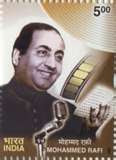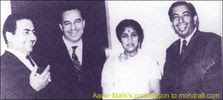Immortal Ghazals sung by Mohammad Rafi.

Mohammad Rafi is a name which has galvanised the Indian firmament during golden age of Indian film music. As his dimension was as wide as the horizon of creative arts, various categories of his songs has been remembered by generations for the last 50 years, including ghazals, Hindustani classical songs, bhajans, folk songs, songs on the freedom movement of India, qawallis, najrul geeti and many more types of geet. Among them ghazal is one category where Rafi’s sweet voice has brought life into the sensational lyrics and outstanding music compositions of the Golden era.
The ghazal is a common song form in India and Pakistan today. There are different definitions of it, but simply it is a musical form, but having a poetic recitation. Today, however, it is commonly conceived of as an Urdu song, with prime importance given to the lyrics. In some modernized ghazals the poet's name is hidden somewhere in the last verse, usually between the front and end of a word.

In the 1950s and 60s, the song picturised on the different films were based on different moods of the characters depicted in the stories. As the lyrics of the ghazals were quite rich, having immense literary and poetic value they generally captured the pensive moods of the major characters of the stories.Most of the films had ghazal in one form or the other composed by the musical giants of the golden age.
Madanmohan used to be considered as the king of ghazals. His most outstanding creations were composed for Mohammad Rafi , including “Tumhari Zulfke sayeme sham karlunga, safar is umraka palme tamam karlunga” from the film Naunihal, 1967, “ Baad muddat ke yeh ghari aayi, aap aye to zindagi ayee”, from the film Zahanara, 1964, “kisiki yaad mai apna ko hai bhulaye hue”, from the film Zahanara, 1964, “ Rang aur noor ki barat tujhe pesh karu, in muradonki hassen raat tujhe pesh karoon,” from the film Ghazal, 1965, “Barbad muhobaat ka dua saath liye ja” from the film Laila Majnu, 1977, picturised on Rishi Kapoor.

There were very dignified ghazals composed by Roshan during that era. Some of them include “ jane who kaun hai kya naam hai in aankhoka” from the film Bheegi Raat, 1965, picturised on Pradeep kumar, “ Hum intezar karenge, tera kayamat tak, khuda kareki kayamat ho, aur tu aye,” from the film Bahu Begum, 1967, “ Aab kya misal doon mai tumhare shabab ki,” and “aapne yaad dilaya tha to mujhe yaad aya” from the film Aarti, 1963, picturised on Pradeep Kumar. Roshan composed one of the most evergreen hit titled “ Zindagi bhar nahin bhulenge woh barsaat ki raat,” from the film Barsaat ki raat, 1960, picturised on Bharat Bhushan.The legendary lyrics were written by Sahir Ludhiyanvi.
S. N. Tripathi composed few immortal ghazals based on the life of the last Mughal Emperor Bahadur Shah Zafar. The songs included “ Na kisisi ki aankh ka noor hoon” and “lagta nahin yeh dil mera” from the film Lal Quila. Jaidev composed one of his master pieces, “ kabhi khud pe kabhi halaat pe rona aya, baat nikli to har ek baat pe rona aya” from the film Humdono, 1961.
Shankar Jaikishan is known to create songs of diverse range of subjects.Even amongst his stylish western compositions the best ghazals were composed for Mohammad Rafi. Some of them include “unke khayal aaye to ate chale gaye” from the film Lal patthar,1971, picturised on Raajkumar, “ Chalke teri aankhose sharab aur ziaada” from the film Aarzoo,1965, picturised on Rajenderkumar, “O Mere Shahe Khuba, o meri Jan- e- jajana” from the film Love In Tokyo, 1965, written by Hasrat Jaipuri and picturised on Joy Mukherjee.
Ravi has composed few unforgettable tunes like “chaudavi ka chand ho yah aaftab ho, jobhi ho tum khuda ki kasam, lajawab ho” from the film Chaudavi ka chand, 1960, picturised on Gurudutt, also “Chulene do nazuk hoton ko, kuch aur nahin hai jaam hai yeh” and “yeh zulf agar khulke bikhar jaye to accha ho” from the film Kaajal, 1965, picturised on Raaj Kumar.
Naushad had done proper justice to each and every raaga he has used to compose his songs. His notable ghazals include “ Mere mehboob tujhe meri mohabbat ki kasam” and “ tumse ishar – e –haal kar baithe” from the film Mere Meheboob, 1963 picturised on Jubileekumar Rajender Kumar” written by Shakeel Badayani, “ koi sagar dil ko behlata nahin” from the film Dil Diya Dard liya,1966, and “aajki shaam mere dilki salaami lele, dilki salaami lele, kal tere bazm se diwana chala jayega, shamma rah jayegi, parwana chala jayega”, from the film Ram Aur Shyam, 1967, picturised on Tragedy king Dilip Kumar.
OP Nayyar had made a very unique use of the santoor with the sarangi, and he too while making his western blend thought about ghazals for Rafi. His best creations include “ aapke hasin rukh pe aaj naya nur hai, mera dil machal gaya to mera kya kusur hai” from the film Baharen phir bhi ayegi , 1966, picturised on Dharmender, and “Aachal me saja lena kaliyan, zulfon me sitaren bhar lena” and “Zulf ke chayon me chehere ka ujaala lekar”from the film Phir Wohi dil Laya Hoon,1963, written by Majrooh Sultanpuri and picturised on Joy Mukherjee.
There were ghazalas from other Classical composers also like “Kahin bekhayal hoker yuhin chuliya unhiko,” and “ Aise to na dekho, ki humko nasha ho jaye” by SD Burman in the film Teen deviya,1965, “Theheriye hosh me aaloon to chalejayiega” by Khayyam.As these songs are soft in nature, they create an everlasting impact on the souls of numerous music lovers of the country who find themselves associated with Rafi. It is very difficult to mention the notable ghazals sung by the maestro who has around 26000 songs in a span of 35 years. An archive should be created where Rafi’s creations are restored, categorised and preserved for future generations to know the noble hertitage of ghazals India had during the golden age.
* Noted and renouned Ghazal Singer, Ghulam Ali had said that Rafi’s songs had reflected the truth that the man possessed and the sweetness of the songs depict his generousness and kindness of heart.
* My father Ex Chief Public Prosecutor of Bankshall court, Chief Metropolitan Magistrate’s Court interviewed Monobendra Mukherjee, the Bengali Classical Singer composing Music for Bengali films Mayamrigo 1960, Joyjayanti,1970, Badhu,1962, and singing more than 1000 nazrul geeti, who said that he used to do the riyaaz everyday for several hours to do justice to his thumris, tappas and he is amazed about only one singer in India, Mohammad Rafi, whose voice floats like a river and the harkats in the songs are so accurate and effortlessly sung like the way clouds flow in the sky.
* Jagjit Singh, one of the most legendary ghazal singers of the present century, said some of the very melodious Ghazals were sung by Rafi during the Golden age, listeners heard them and appreciated them even sometimes not knowing that they are categorized as ghazals. Jagjit Singh composed music for noted film Saath Saath and TV serial Mirza Ghalib starring Nasir uddin Shah and directed by Gulzar.
Related Reading
- Immortal Ghazals sung by Mohammad Rafi.
- Awards received by Mohammad Rafi in his illustrious career.
- Mohammad Rafi- the greatest voice of the last century.
- Rahul Dev Burman’s immense respect for Mohammad Rafi.
- Laxmikant Pyarellal’s immortal relationship with Mohamand Rafi.
- OP Nayyar’s immortal relationship with Mohammad Rafi.
- Salil Chowdhury’s relationship with Mohammad Rafi.
- Ravi’s memorable combination with Rafi.
- Roshan's everlasting bond with Mohammad Rafi.
- SD Burman and Mohammad Rafi.
- Rafi’s pleasant memories with Madanmohan.
- Khayyam and Jaidev’s relationship with Mohammad Rafi.
- Kalyanji Anandji’s association with Mohammad Rafi.
- Naushad’s association with Rafi.
2 comments:
Rafi had all the sweetness required for singing ghazals embedded in his voice. Songs "like guzre hai", "lute dil pe diya jalta nahi" are timeless classics and will always remain immortal for genertions.
Rumi Chatterji.
Sir:
Rafi sahib was classified as an “Indian classical, ghazal, and playback singing” which means he encompasses the entire spectrum of Indian music. It can be safely said that he was one of the most versatile and talented singers Indian film industry has ever or even will produce.
I don’t how you have classified ghazal, here because this discussion is massively discrepant, as it does not focuses on the ghazals, the maestro had rendered. They became famous , they were also private ones , (328 private (non-film) songs from 1945 to 1980)or sung for the films but did not make in the final product and these ghazals were musically directed by no less people as Khayyam , Naushad. And authored by colossi like Mirza Ghalib, Meer Taqi Meer, Daag Dehlvi, Jan Nissar Akhtar and many others.
Though the man died in 1980, the magic still lives on and continues to enchant countless millions daily for the last 30 years, more even than it did perhaps during his life.
Paradoxically enough Director O. P. Nayyar was so impressed with Rafi that he got Rafi to sing a song Man mora baawara for singer-actor Kishore Kumar, in the movie Raagini. Later, Rafi would sing for Kishore Kumar in movies such as Baaghi, Shehzaada and Shararat.
Listed below are the ghazals / geets that he has gifted the world with.
Ghazals …..
Pooch Na Mujh Say Dil,
Na Shauq-E-Wasl Ka Daawa,
Muddat Howe Hay Yaar,
Meri Mohabbat Qabool Karlo
Maine Jab Se Tujhe Aye
Lagta Nahi Hay Dil Mera
Kitni Rahat Hay Dil Toot
Kissi Ki Yaad May Duniya
Kabhi Sukon Ko Kabhi
Jeenay Ka Raaz
Ishq Ki Garmiyay Jazbaat
Humsafar Saath Apna Chor
Haal Dekho Jo Bayqararoon Ka
Ghazab Kiya Teray Waday
Falsafe Ishq Mein Paish
Ek Hi Baat Zamanay Ki Kitaboon
Door Rehkar Na Karoo Baat
Diya Yeah Dil Agar Us Ko
Dil Ki Baat Kahi Nahi Jaati
Dard Minnat-E-Kashay
Bazeecha-E-Atfal Hay
Bas Ke Dushwar Hay
Aye Taza Waridan
Arman Machal Rahay Hain
yaa merii manzil bataa
kahini se maut ko laao
Ham aapki mahafil me
Or geets like ….
Caravan Guzar Gaya Ghubar Daikhtay Rahay
MujheDard-e-DilKaPata-MajroohSultanpuri
Tere pyaar ne mujhe
I thank you for your attention and consideration and remain,
Yours truly
Omer Ismail
MD, MBA, MS, PhD
Toronto. On. Canada
Post a Comment